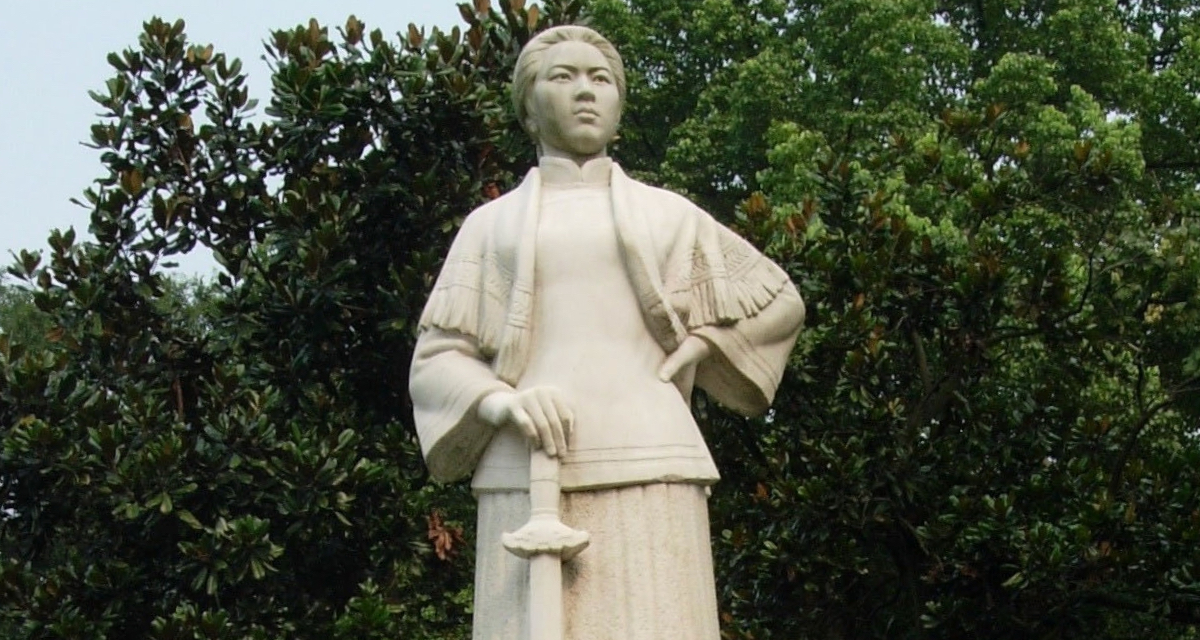Happy Women’s History Month! As someone who studied history in college and loved it, I’m excited for any opportunity to share the women in history I find most fascinating. In particular, this is a great opportunity to share with you some heroes who might have gone under-appreciated in modern schooling. One such figure, and the one I’m gonna kick off this month with, is among my personal favorite feminists in history: Qiu Jin, often dubbed China’s “Joan of Arc.”
There’s a great wealth of feminist history in China, and Qiu Jin is one of the most prominent, fascinating figures that I studied. Born in 1875, she was raised in a society that still condoned foot-binding, yet since she was born to a wealthy family in a fairly accessible province, she was able to grow up in a more liberal fashion. From a young age, Jin was a brilliant and curious girl, raised by government officials who absolutely influenced her ideals and passion as she grew up. In her spare time, she loved to write, practice swordsmanship, and cross-dress. Jin fantasized about living an adventurous life, like that of her ultimate idol, Hua Mulan. Yet she was bound by traditional Chinese society at the time, which dictated that she repress her fanciful notions and remain subdued and loyal, as all women were expected to be.
Indeed, Chinese society during this period of history was at a crossroads, internally crumbling and externally vulnerable. It was the time of the Qing dynasty, the very last dynasty in Chinese history, and a time of great socio-political stress. The conventions of yore were quickly becoming challenged by new generations of thinkers and activists, and at the same time, foreign powers were constantly banging on China’s door, demanding full access. Qiu Jin occupied that sticky part in the middle that we all must fight for in times of great stress: the right for women to have complete autonomy and shake the patriarchal constraints of the past.
This became especially important to Jin when she was finally forced to marry at age 21—which was fairly late for the time! Jin’s marriage was a miserable one, especially after the free-spirited days of her childhood. The end of the First Sino-Japanese War provided an opportunity for Jin to flee to Japan for an education, which ultimately proved to be her greatest liberation.
Through her schooling, Jin became acquainted with several like-minded people, both male and female, who became her comrades in the crusade for citizen liberation. Specifically, Jin fought for the rights of women, attempting to reach them through her own writings (she was a talented poet, and I encourage you all to read her poems). One such pamphlet, titled “An Address to My Two Hundred Million Women Compatriots in China,” is a particularly fascinating and enlightening read. I’ll share important sections below:
Alas, the most unfair treatment in the entire world is suffered by us…this is true from the moment we are born: if you have a good father, things may still be all right, but if your father is a muddleheaded, unreasonable type, he will only keep shouting: “What bad luck! Yet another useless one!” And he will want to snatch you and crush you to death!…As soon as you are a few years old, they will, completely ignoring the consequences, take your snow-white and so very tender natural feet and bind them tightly with white-linen…Eventually all the flesh will rot away and the bones will be broken, just so that relatives, friends, and neighbors may say: “Such-and-such little girl has such tiny feet!”
When it comes to selecting a marriage partner, they will completely rely on the words of two shameless matchmakers. As long as the family of the groom has money and power, they don’t care whether or not he is sound of body…If you utter even a few words of complaint or say a few words of reproof to your husband…you’ll be be beaten and cursed. When outsiders hear about it, they’ll just say: “She’s stupid and does not understand the Wifely Way.” Dear listeners, is this not a case of suffering an injustice and having nowhere to lodge a complaint?
…so we have become their slaves. And since we are their slaves, of course we suffer oppression! But since we ourselves are to blame, how can we carry a grudge against others?…
But I hope that from now on we sisters will do away with the state of affairs from the past and exert ourselves to create new circumstances. It is as if we had died and been reborn as human beings…
Dear listeners, do you realize that our nation is about to perish? Men cannot be sure of their own survival, so how can we continue to rely on them? If we do not lift ourselves up now, it will truly be too late once the nation has perished. Dear listeners, do not let me down!
Qiu Jin, “An Address to My Two Hundred Million Women Compatriots in China,” via The End of the Dynasty (pages 185-187).
Jin’s career as an activist took her down all kinds of enterprising roads. She founded her own feminist magazine, Chinese Women’s Journal, which was pretty radical at the time for using common vernacular instead of the language used by elites. Jin believed that all women in China deserved equal rights, regardless of class or education.
At the same time, Jin ran with the likes of Sun Yat-sen (another revolutionary to look into!), and other radicals and revolutionaries who sought to revolt against the Manchus. She learned how to make bombs, and was especially talented in that regard. Jin passed all of this knowledge down to students at the Datong School, a front for radicalizing and preparing youth for an anti-Manchu revolt.
Ultimately, these efforts would be repaid with execution; Jin was killed in 1907, at the age of 31. Her final written words were a poem: Autumn wind, autumn rain, fill my heart with sorrow. Jin’s legacy has endured, even in modern times, as she is still revered by many Chinese women. I was particularly excited for a chance to write about her because I feel like people educated in Western countries only learn reductive versions of Chinese history, especially with regards to the women of China. The history of China is deep and profound, and the role women played in its shaping is no small thing.
There are so many parallels between Qiu Jin’s struggles and the modern struggles we face as women and activists, yet there’s something heartening in knowing that, even a century ago, good women were fighting for us all. I hope you enjoyed learning about her as much as I did!
(featured image: Wikimedia Commons)









